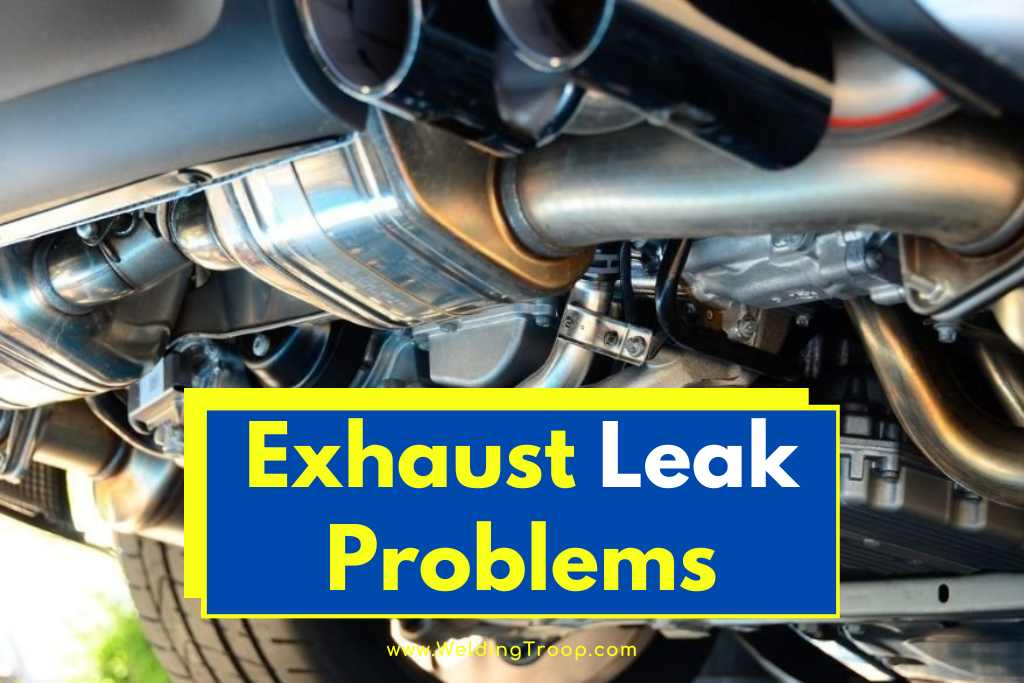The exhaust system is a crucial component of your vehicle, responsible for routing toxic gases away from the passengers and driver, muffling engine noise, and controlling emissions.
However, this system is prone to leaks, which can have detrimental effects on performance, emissions, and even your health. In this comprehensive guide, we will explore exhaust leaks in depth, including their causes, symptoms, and solutions.
By understanding the importance of addressing exhaust leaks promptly, you can ensure the safety, efficiency, and longevity of your vehicle.
Table of Contents
1. Understanding Exhaust Leaks
The exhaust system in your car is an interconnected assembly of pipes, connectors, sensors, and mechanical devices designed to handle and dispose of exhaust fumes produced during the engine’s combustion process.
When an exhaust leak occurs, gases escape from the system before reaching the tailpipe, potentially entering the passenger cabin and posing health risks.
These leaks can occur at various points along the exhaust system, from the exhaust manifold to the tailpipe, and can have significant consequences if left unresolved.
2. Causes of Exhaust Leaks
Exhaust leaks can have multiple underlying causes, ranging from natural wear and tear to external factors. Understanding these causes can help you identify potential issues and take preventive measures to avoid exhaust leaks. Some common causes of exhaust leaks include:
Corrosion
Exhaust systems are exposed to harsh driving conditions, road salt, and debris, making them susceptible to corrosion. Over time, this corrosion can weaken the integrity of the system and lead to leaks.
Physical Impacts
Driving on uneven roads or hitting potholes can cause damage to the exhaust system, resulting in leaks. The impact from road hazards can cause pipes to crack or disconnect, allowing gases to escape.
Worn-Out Gaskets
Gaskets, such as those found between the exhaust manifold and the engine, can deteriorate over time and create uneven surfaces that enable leaks. Regular maintenance and replacement of worn-out gaskets can help prevent exhaust leaks.
Poor Welds or Repairs
Inadequate welding or previous repairs on the exhaust system can result in weak spots that are prone to leaks. It is essential to ensure that any repairs or modifications to the exhaust system are performed correctly to avoid future leaks.
Time and Age
As with any automotive component, the exhaust system will naturally deteriorate over time. The constant exposure to heat, vibrations, and environmental factors can lead to weakened pipes and potential leaks. Regular inspections and maintenance can help identify and address issues before they escalate.
3. Common Symptoms of Exhaust Leaks
Detecting exhaust leaks promptly is crucial to prevent further damage and ensure your safety. Here are some common symptoms that may indicate the presence of an exhaust leak:
Unusual Engine Noise
One of the most noticeable signs of an exhaust leak is an increase in noise coming from the engine. If you hear a rumbling, hissing, or tapping sound that is louder than usual, it may indicate a leak in the exhaust system.
Decreased Fuel Efficiency
Exhaust leaks can disrupt the optimal functioning of your engine, leading to a decrease in fuel efficiency. If you notice that you are filling up your tank more frequently than usual, it could be a sign of an exhaust leak.
Vibrations
Leaking exhaust gases can cause vibrations in your vehicle, which can be felt through the gas pedal, steering wheel, or even the entire cabin. If you experience unusual vibrations while driving, it is important to have your exhaust system inspected.
Unusual Odors
Exhaust leaks can result in the smell of exhaust fumes entering the passenger cabin. If you detect a strong odor of exhaust while driving, it is crucial to address the issue promptly to prevent the inhalation of toxic gases.
Check Engine Light (CEL)
An exhaust leak can trigger the check engine light on your dashboard. The onboard diagnostic system may detect abnormal readings from oxygen sensors or other components affected by the leak.
Poor Performance and Acceleration
Exhaust leaks can disrupt the engine’s back pressure, leading to a decrease in power and sluggish acceleration. If you notice a significant loss of performance accompanied by other symptoms on this list, it may indicate an exhaust leak.
Read also >> Exhaust Brake Problems (Here Is How To Fix)
4. Dangers of Exhaust Leaks
Addressing exhaust leaks is not just a matter of noise reduction or fuel efficiency; it is crucial for your safety and the well-being of your passengers. Ignoring exhaust leaks can lead to several serious consequences:
Carbon Monoxide Poisoning
Exhaust leaks can allow carbon monoxide, a highly toxic gas, to enter the passenger cabin. Carbon monoxide is odorless, colorless, and tasteless, making it difficult to detect without proper monitoring equipment.
Prolonged exposure to carbon monoxide can be fatal, emphasizing the importance of addressing exhaust leaks promptly.
Damage to Catalytic Converters
Excess oxygen entering the exhaust system due to a leak can cause damage to the catalytic converters. The unburned fuel in the exhaust stream can ignite within the converters, leading to deterioration and potential blockage, which affects their ability to reduce harmful emissions.
Malfunctioning Oxygen Sensors
Exhaust leaks can result in the fouling of oxygen sensors, causing inaccurate readings and potential malfunctions.
Faulty oxygen sensors can negatively impact fuel economy, engine performance, and even trigger additional error codes, making it more challenging to diagnose other issues.
Internal Engine Damage
In severe cases, exhaust leaks near the exhaust manifold can lead to increased heat in the engine’s combustion chambers. This excessive heat can cause damage to internal engine components, such as valves, resulting in costly repairs.
5. How to Determine and Locate Exhaust Leaks
Identifying and locating exhaust leaks is the first step towards resolving the issue. Here are a few methods you can use to determine the presence and location of an exhaust leak:
Visual Inspection
Inspect the visible components of your exhaust system, including pipes, connectors, and gaskets, for any signs of damage or corrosion. Look for cracks, holes, or loose connections that may indicate a leak.
Listening for Unusual Sounds
While the vehicle is running, listen for any unusual sounds coming from the engine or exhaust system. Hissing, tapping, or rattling noises may indicate the presence of a leak.
Feeling for Vibrations
Pay attention to any vibrations you feel while driving, especially through the gas pedal, steering wheel, or floorboards. Vibrations may indicate a leak in the exhaust system.
Soapy Water Test
Spray a mixture of soapy water onto the suspected areas of the exhaust system. If there is a leak, the escaping gases will cause the soapy water to bubble or foam, indicating the location of the leak.
Professional Inspection
If you are unable to locate the exhaust leak yourself, it is recommended to seek professional help from a qualified mechanic or automotive service center.
They have the expertise and specialized tools to accurately diagnose and repair exhaust leaks.
6. Repairing Exhaust Leaks
Once you have identified the presence and location of an exhaust leak, it is crucial to address the issue promptly to prevent further damage and risks. Here are some common repair methods for exhaust leaks:
Replace Damaged Components
If a specific component, such as a cracked pipe or deteriorated gasket, is causing the exhaust leak, it may need to be replaced. Consult with a professional mechanic to determine the appropriate replacement parts for your vehicle.
Welding or Patching
In some cases, minor exhaust leaks can be repaired through welding or patching. However, it is essential to ensure that the repair is performed correctly to prevent future leaks or damage to surrounding components.
Professional Exhaust Repair Services
For more complex or extensive exhaust leaks, it is recommended to seek the services of a professional exhaust repair specialist.
They have the expertise and equipment to diagnose, repair, or replace components of the exhaust system accurately.
7. Prevention and Maintenance
Preventing exhaust leaks is essential for the long-term health and performance of your vehicle. Here are some preventive measures and maintenance tips to minimize the risk of exhaust leaks:
Regular Inspections
Schedule regular inspections of your exhaust system to identify any potential issues before they escalate. A trained mechanic can detect early signs of corrosion, damage, or worn-out components and address them promptly.
Avoid Harsh Driving Conditions
Minimize exposure to harsh driving conditions, such as rough roads or excessive road salt. If possible, avoid driving through deep potholes or areas with loose debris that could cause physical damage to your exhaust system.
Timely Replacement of Gaskets
Regularly inspect and replace worn-out gaskets, such as those between the exhaust manifold and the engine, to maintain a proper seal and prevent leaks. Follow the manufacturer’s recommendations for gasket replacement intervals.
Use High-Quality Exhaust Components
When replacing or repairing components of your exhaust system, choose high-quality parts that are designed for your specific make and model. These components are more likely to provide a proper fit and withstand the demands of the exhaust system.
Regular Maintenance
Follow the recommended maintenance schedule for your vehicle, including oil changes, filter replacements, and tune-ups. Properly maintained engines are less likely to experience issues that can lead to exhaust leaks.
8. The Importance of Prompt Action
Exhaust leaks may seem like a minor inconvenience, but their consequences can be severe. Promptly addressing exhaust leaks is essential for several reasons:
Safety
Addressing exhaust leaks is crucial for your safety and the safety of your passengers. Carbon monoxide poisoning and exposure to toxic gases can have life-threatening consequences. By promptly repairing exhaust leaks, you can ensure a safe and healthy driving environment.
Performance and Efficiency
Exhaust leaks can negatively impact your vehicle’s performance and fuel efficiency. By resolving these leaks, you can restore optimal engine performance, improve fuel economy, and enjoy a smoother driving experience.
Emissions Compliance
Many regions have strict emissions regulations that vehicles must adhere to. Exhaust leaks can lead to increased emissions, potentially causing your vehicle to fail emissions tests. By promptly addressing exhaust leaks, you can ensure compliance with environmental regulations.
Cost Savings
Addressing exhaust leaks promptly can help you avoid costly repairs down the line. Ignoring leaks can lead to further damage to the exhaust system or internal engine components, resulting in more extensive and expensive repairs.
Conclusion
Exhaust leaks are not to be taken lightly. They can impact your safety, vehicle performance, emissions compliance, and overall driving experience.
By understanding the causes, symptoms, and solutions to exhaust leaks, you can take proactive measures to prevent and address these issues. Regular inspections, prompt repairs, and proper maintenance are essential for the longevity and safety of your vehicle.
Remember, when it comes to exhaust leaks, prevention and timely action are key.

